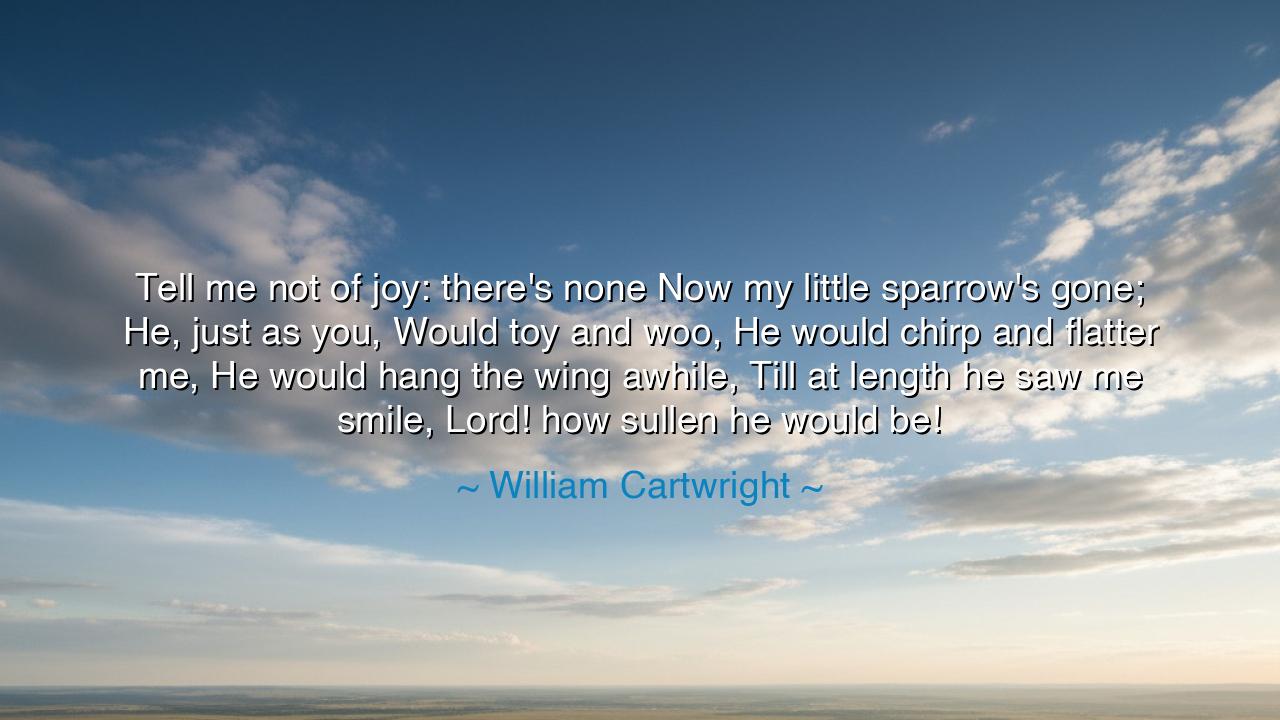
Tell me not of joy: there's none Now my little sparrow's gone;
Tell me not of joy: there's none Now my little sparrow's gone; He, just as you, Would toy and woo, He would chirp and flatter me, He would hang the wing awhile, Till at length he saw me smile, Lord! how sullen he would be!






William Cartwright, the poet of the seventeenth century, gave voice to sorrow in the words: “Tell me not of joy: there's none Now my little sparrow's gone; He, just as you, Would toy and woo, He would chirp and flatter me, He would hang the wing awhile, Till at length he saw me smile, Lord! how sullen he would be!” At first glance, these lines seem simple—an elegy for a lost bird. Yet when pondered deeply, they reveal truths about love, loss, and the fragility of joy itself. For the sparrow is not only a creature of feathers, but a symbol of intimacy, companionship, and the delicate ties that bind us to happiness.
The ancients often used birds as symbols of the soul, of fleeting joy, and of divine messengers. In this poem, the sparrow stands as a companion that brought light and play to the poet’s days, wooing and flattering like a lover, lifting spirits with song, and sulking in mock despair until met with a smile. Its absence, then, is not merely the silence of a cage—it is the silence of the heart when joy departs. Cartwright’s lament is that once such a bond is broken, once that little life is extinguished, even the world’s remaining delights seem barren.
History offers many echoes of this lament. Consider the Roman poet Catullus, who also wrote of his beloved’s pet sparrow, mourning its death with words that transcended the mere loss of a bird. To him, as to Cartwright, the sparrow was not only an animal, but a vessel of affection, a symbol of tenderness and playfulness that could not be replaced. Such creatures, though small, embody the intimacy of daily joy, and their passing reminds us of the frailty of love in a world marked by loss.
There is also in Cartwright’s lines a meditation on the nature of memory. The poet recalls the sparrow’s antics, its games of wooing, its mock sullen glances when denied attention. These memories are not presented coldly, but with such warmth that we feel the presence of the bird still lingering in the poet’s chamber. Yet herein lies the paradox: memory brings comfort, but also sharpens grief. To remember the smile that once answered the sparrow’s play is to feel more keenly the silence it leaves behind.
His words also remind us of how love dwells in the smallest details of life. It is not always the grand gestures that carry joy, but the little songs, the brief games, the small companions who share our days. When they are gone, their absence feels enormous, for it is woven into the fabric of our daily being. The poet’s refusal to hear of joy, his cry that “there’s none”, teaches us how deeply the heart is tied to the ordinary moments of tenderness we often overlook until they vanish.
The lesson is both tender and powerful: do not dismiss small joys, nor underestimate the bonds of affection with the humble creatures and fleeting moments of life. A bird, a smile, a gesture of companionship—these are the threads from which happiness is spun. To lose them is painful, yet to have known them is a treasure greater still. Even in grief, Cartwright’s poem bears witness to the richness of love, for only great joy can birth such sorrow.
So, my children, learn from the poet’s lament. Cherish the sparrows in your own life, whether they be people, creatures, or fleeting joys that brighten your days. Do not wait for their absence to teach you their worth. Smile at them while they are near, for one day memory alone may carry them. And when loss comes, as it must, let the pain remind you not of emptiness, but of the depth of love you were blessed to hold. For though the sparrow is gone, the love it awakened remains eternal, and in that, there is still a form of joy.






AAdministratorAdministrator
Welcome, honored guests. Please leave a comment, we will respond soon